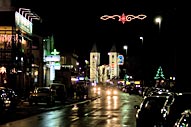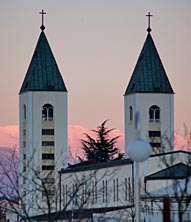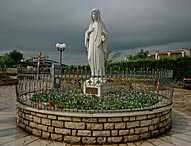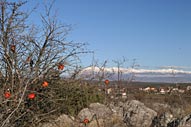date: 26.10.2007.
Alois Epner (76) is a retired teacher from Upper Austria. He was born in Croatia, but in 1944, the Epner family had to flee the country to escape from the communists. Although he never forgot his childhood in his native Croatia, he found a new home in Upper Austria. He visited Medjugorje for the first time in 1984, and since then he returns on a regular basis. When he speaks about his experiences, his eyes fill with tears. (Interview: Krešimir Šego)
Mr. Epner, for many years now you have regularly visited Medjugorje, either with your family or with the pilgrims. When and in what circumstances did you first hear about Our Lady’s apparitions in Medjugorje?
From time to time there are reports in our newspapers, although rather sensational in tone, about events in Medjugorje. I got one such newspaper report about Medjugorje and the apparitions from a friend of mine. My first reaction was… we have Lourdes, Fatima and La Salette… nothing more is needed. We already know what we have to do. Nowadays, many pretend to have apparitions, some of which include threats beginning with “If you do not…!” , and consequently, I read the newspaper report with very critical eyes. Nevertheless, since my childhood I have always felt very close to Mary, although venerating her, above all else, as Queen of Heaven.
During a lecture on Padre Pio, an acquaintance of mine spoke to me about Medjugorje. Skeptically, I asked her : Is there any truth in these reports? Her answer was short and concise: Go and see for yourself. I did so! The pilgrim group was too pious for my taste, and was inclined to overly busy activities. This I found somewhat suspect, with the result that I wanted to go back home, because I thought that, if this is Medjugorje, then it’s not for me.
These are the circumstances surrounding my first visit to Medjugorje in March 1984, not to mention my exhaustion and lack of sleep. I realized however that my first impression was not a fully informed one. There just had to be more to it than that!
Although the others climbed Cross Mountain, I didn’t. Instead, I wandered around the mountainside, where I chanced to meet a young lad, Stipe by name, from Medjugorje. He brought me to his house where we talked a lot, mainly about things which occurred outside of the circle of the visionaries. We visited Jelena. I noticed at once the honesty and the sincerity of this child, and I was fascinated. I wanted to make contact with the visionaries. Stipe introduced me to Ivan, but this however didn’t bring about any “encounter” with Our Lady for me. Although I never had a personal encounter with Our Lady, I nevertheless felt close to her. I still remember the time when the six visionaries used to go from the sacristy, across the altar area, into a small room on the right side of the altar. We felt as though we were right in the midst of them. As Vicka says, there was no wall for us. We saw nothing, but we felt Our Lady’s presence. We were completely fascinated. We looked at the statue, which at that time stood at the side of the Ambo, approximately where the choir currently sings, but beneath this statue, our spiritual eyes beheld the Mother, and those eyes were filled with tears. Amazed, we remained either flat of the floor, or knelt, or sat in awe.
What influenced you to come to this place?
At that time, I was searching; I was not at peace with my life as it was at the time. I was a Catholic and I went to church, but I only did so superficially. Deep inside myself it felt as if nothing satisfied me. Although I felt that I couldn’t continue in this way, I didn’t really know how I could change. I often read Holy Scripture, but I knew all the passages more in theory than in practice. I didn’t have a personal relationship with God. I felt rather hopeless. At that time Medjugorje was relatively small, with the result that Ivan was able to transmit my question to the Gospa: “Will that man free himself from this condition?” There was no answer, despite the fact that answers were sometimes given at that time. Later, we re-phrased the question: “What must I do, in order to come out of this precarious situation?” This time the answer came:
“To pray as much as possible, to consecrate himself to my Son Jesus, and to leave everything else to God!” Our Lady pointed precisely towards the three essential points. As a child, I loved to pray the Rosary. During the bomb attacks in the Second World War, my brother and I used to pray the Rosary aloud, while in the bomb shelters. This practice ceased, however, during puberty time. I could not pray any longer, yet here I was being advised to pray “as much as possible”! I had to force myself to do so, and it proved to be a very hard and laborious exercise.
Step by step, I managed to pray one decade of the Rosary. Then quite unexpectedly, it did not seem to be dull or monotonous any more. It became vibrant, in fact. After approximately two months, something inside me advised: If you want to pray, then take time, sit down and pray quietly. By then this had become possible for me. The second request - consecrate yourself to my Son Jesus - was even more difficult still, because I felt that I would no longer be master over myself. By and large I am a self-driven, independent person. Consecration seemed to me to mean giving up all of this, which I did not want to do. But later I understood that consecration meant receiving God’s help, rather than a total surrender. Slowly I began to entrust my life to God. Even now, after 23 years of Medjugorje, I still find it difficult to abandon everything to God. Only by degrees am I learning that God is not only doing everything well, but even better than I ever could myself.
What did you expect from your first pilgrimage, and what did you actually experience? Did you ever think that it was a waste of time and money?
I have described what in fact my expectations were at the start of my pilgrimages. I never thought that the journeys were useless, as my own experience proved to be the case. What more have I experienced? I have never seen anything, not even what others have seen. Once, some people stood around me and looked towards Cross Mountain, noticing some unusual feature. I saw nothing. I said half aloud: I am probably not worthy to see something. Then a native woman, with her hands on her hips, remarked: Worthy? None of us is worthy, but you probably don’t need to see in order to believe.
Did Medjugorje influence your life, or the life of your family? If so, how? What has changed?
In the beginning, I believed that I could involve my whole family. That was my wish then, and it remains my desire to this very day. Sometimes I think that Our Lady doesn’t understand what it means to motivate grown up children! We can pray for them, that’s all! We can entrust them to God and invoke God’s blessing and the blessing of our Mother Mary upon them. If this can bring a change, then let it be according to God’s will. Very often, while praying the Way of the Cross, I carried little stones as far as the Cross, attributing to each stone the name of one of my children or of a family member, and laying them down under the Cross, I prayed in tears: “Mother, take them in your hand and never let them go.”
You practiced your Catholic faith before visiting here. So what has changed in your life?
Yes, I went regularly to church, yet despite not sitting passively there, I did not find what I was looking for. I prayed when I had time. I spent short bursts of time in prayer. As I have already said, I had little regard for the Rosary. You ask me, what has changed through my contact with Medjugorje? I am trying to pray regularly again. Being in contact with other pilgrims, we have formed a couple of prayer groups. We meet once a week. I am the group leader. It is pleasing to see, how people are changing deep within themselves. I can state however that I am far from becoming a saint, although I am aware of an inner strengthening.
When did you bring your first group of pilgrims?
That was during Holy Week in March of 1985. I did not want us to drive through the night, because of my previous bad experiences with night travel, so I had to organize overnight accommodation in a hotel. Consequently we spent most of the night in Otocec near Novo Mesto. I prefer it this way, because it allows us to leave everything in detailed readiness in the bus, which I think is vitally important for each individual pilgrim. Above all, I appreciate the possible change for each personal life style – conversion! The curiosity of the pilgrims must be catered for also. We can describe Our Lady’s apparitions for them according to what the visionaries themselves say. Some do not find that necessary, but if heaven wants these apparitions and the other phenomena occurring in Medjugorje, why not to speak about them? They are confirmations from heaven, a kind of guarantee that the events are of divine origin. They strengthen the faith. However the messages themselves offer guidance, advising how to walk towards salvation and holiness. In the beginning, we had a lot of contact with the visionaries. This contact has decreased with the passage of time. As pilgrims, we now concentrate on the triangle formed by the Church, the Cross Mountain and Apparition Hill, thereby pointing us towards what is both concrete and substantial, enabling us to put the messages into practice, both within ourselves and on behalf of others. We are filled with joy when we see the fruits of Medjugorje, such as Cenacolo, the Mother’s Village, and many other grace filled realities which proceed from the messages, not only in Medjugorje itself, but elsewhere thank God.
You have continued to bring pilgrims. What do people expect from Medjugorje? Those who have been once, are they inclined to come again? Do you always have new pilgrims in your groups?
While some come out of curiosity, it is mostly a personal need, a great longing for inner healing, that induces pilgrims to visit Medjugorje. Most of the time, when the pilgrims return home, they are somehow different to when they came. They have experienced something that inspires them to think differently. We notice the grace transmitted by the Mother of God. We notice this particularly when the pilgrims give their witness on the bus over the microphone. Many return again and again with us, becoming old acquaintances as a result. They persistently seek refreshment and new inspiration for their lives, because we all know that we have to repeat something often, for it to become a habit, a good habit.
Austria is a rich country. People have work and enjoy a high standard of living, yet they still go on pilgrimages. What brings them to this place of prayer? Is it a desire to indulge traveling, or is it something deeper?
It is true that Austria is a rich country, but we do not live on bread alone. We desire to be filled with the word of God also. Material wealth can precipitate misfortune. Therefore people feel attracted to this place, where they believe they can find something else other than money and material goods. Many marriages are broken because of wealth, and many young people go astray, the consequences of which we see in the Cenacolo. Our souls can suffocate in material wealth. Although less would be better, who will begin with oneself?
It is amazing, to observe the length of time people stay in the church here in Medjugorje, praying and going to confession, in order to relieve some burden. Our pilgrims behave differently in Medjugorje than they do at home. If they behaved this way at home, they would be noticed by others, and who wants to be noticed in such matters?
Coming here is not merely a journey where people seek to see or experience a foreign country. Instead it is a deep longing to meet God. One can experience such an encounter here with the help of the Gospa. All of this proves that we cannot live on bread alone.
When you sit in the bus with the pilgrims, what do you tell them during the journey?
As our pilgrims usually know what Medjugorje is all about, we can begin with prayer and singing. As regards the first-timers, I usually say that we will pray more than is usual during the pilgrimage, emphasizing that prayer is important. We speak about the apparitions, as curiosity must be satisfied. If it were not so, Our Lady would obstruct curiosity, but instead she uses it, in order to lead people to what is substantial.
Are people living the messages of the Queen of Peace? Are they changing their lives?
Yes, I notice this again and again. People have good will and determination to direct their lives according to the messages. However, although the spirit is willing the flesh is weak… therefore we must come again and again to Medjugorje to deepen or renew our resolutions.
People change very slowly. For something to be solid, it must continue to grow.
In your experience to date, what do the messages of the Queen of Peace mean for people today, for humanity as a whole? Can you imagine a world without this time of grace?
The messages provide real and necessary guidelines for modern mankind. When I read the reports, how the messages are lived in Europe, in North and South America, in Africa, in China, in India, or even in Japan, and how they provoke change, then I believe that there is a hunger for this grace at this time. We are grateful to the Queen of Peace here in Medjugorje for her readiness to intercede for us in this time of grace. The world proceeds in an unpredictable manner, possibly even leading into an abyss, and it would surely lead into the abyss if God was not showing us another way. We cannot live on material wealth alone. This is our problem in the developed countries. We did not earn wealth. It is not a recompense for something. It is a temptation. If we use it unilaterally, it can provoke great spiritual suffering. Although we make efforts to share our wealth with poor countries, we could do much more. We ask God for the grace to come to our senses. By degrees, our young people are beginning to think differently. Seeking more solid values, God is slowly born within them. The annual Youth Festival in Medjugorje gains ever increasing strength and interest. Not all young people come here. We are aware of that, so we have to pray ever more fervently for them and carry many more stones up Cross Mountain and up Apparition Hill, so that people are open to God’s mercy.



